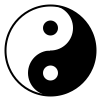Example 2: Taijitu (Yin Yang)
refresh(dc, width, height) // Sample code by Jim Bumgardner
{
dc.clearRect(0,0,width,height);
var rad = width*.45;
var cx = width/2;
var cy = width/2;
var sm_rad = rad/2;
var cx1 = cx;
var cy1 = cy+sm_rad;
var cx2 = cx;
var cy2 = cy-sm_rad;
dc.fillStyle = '#000';
dc.beginPath();
dc.arc(cx,cy,rad,0,2*Math.PI,false);
dc.fill();
dc.clearRect(0,0,width/2,height);
dc.beginPath();
dc.arc(cx1,cy1,sm_rad,0,2*Math.PI,false);
dc.fill();
dc.fillStyle = '#FFF';
dc.beginPath();
dc.arc(cx2,cy2,sm_rad,0,2*Math.PI,false);
dc.arc(cx1,cy1,sm_rad/3,0,2*Math.PI,false);
dc.fill();
dc.fillStyle = '#000';
dc.beginPath();
dc.arc(cx2,cy2,sm_rad/3,0,2*Math.PI,false);
dc.fill();
dc.strokeStyle='#000';
dc.lineWidth = 2;
dc.beginPath();
dc.arc(cx,cy,rad,0,2*Math.PI,false);
dc.stroke();
}
Let's examine the program in detail. First I compute the radius of the outer circle, and its center cordinates, based on the overall width of the drawing. I make it proportional to the width so that if the size is changed, the figure will resize along with the drawing.
var rad = width*.45; var cx = width/2; var cy = width/2;The final figure contains curves which are based on a circle exactly half the size of the larger circle. Here, I work out the radius of this smaller circle.
var sm_rad = rad/2;Then I work out coordinates for the center of the black and white dots in the figure.
var cx1 = cx; var cy1 = cy+sm_rad; var cx2 = cx; var cy2 = cy-sm_rad;Now I am ready to start drawing. First I draw a large black circle.
dc.fillStyle = '#000';
dc.beginPath();
dc.arc(cx,cy,rad,0,2*Math.PI,false);
dc.fill();
It looks like this:
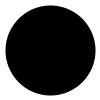
Then, I paint half the canvas with a white rectangle, to blank out half of the circle.
dc.clearRect(0,0,width/2,height);
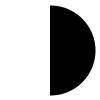
Then I draw a small black half-sized circle.
dc.beginPath();
dc.arc(cx1,cy1,sm_rad,0,2*Math.PI,false);
dc.fill();

And a small white circle above it. A second arc in this block draws the small white eye.
dc.fillStyle = '#FFF';
dc.beginPath();
dc.arc(cx2,cy2,sm_rad,0,2*Math.PI,false);
dc.arc(cx1,cy1,sm_rad/3,0,2*Math.PI,false);
dc.fill();
Here's the half-sized white circle.
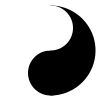
And here's the small white eye.
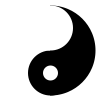 The radius of the small white eye is 1/3rd that of the half-sized circle
(I found a size I liked through experimentation, the drawings I've found online vary depending on the artist).
The radius of the small white eye is 1/3rd that of the half-sized circle
(I found a size I liked through experimentation, the drawings I've found online vary depending on the artist).
Then I draw the small black eye.
dc.fillStyle = '#000';
dc.beginPath();
dc.arc(cx2,cy2,sm_rad/3,0,2*Math.PI,false);
dc.fill();
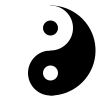
Finally, I am ready to draw the circular frame. I use a slightly thicker line thickness of 2 here, because I think it looks nice.
dc.strokeStyle='#000';
dc.lineWidth = 2;
dc.beginPath();
dc.arc(cx,cy,rad,0,2*Math.PI,false);
dc.stroke();
